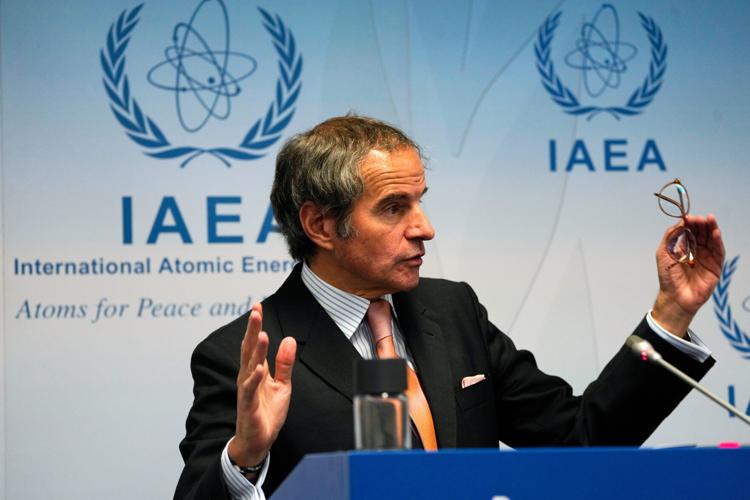VIENNA — Iran further increased its stockpile of uranium enriched to near weapons-grade levels, a confidential report by the U.N. nuclear watchdog said Saturday. In a separate report, the agency called on Tehran to urgently change course and comply with its yearslong probe.
The report came at a sensitive time, as U.S. President Donald Trump's administration seeks to reach a deal with Tehran to limit its nuclear program. The two sides held several rounds of talks, so far without agreement.
The report by the Vienna-based International Atomic Energy Agency — seen by The Associated Press — says that as of May 17, Iran amassed 900.8 pounds of uranium enriched up to 60%.
That's an increase of 294.9 pounds — or almost 50% — since the IAEA's last report in February. The 60% enriched material is a short, technical step away from weapons-grade levels of 90%. A report in February put this stockpile level at 605.8 pounds.
People are also reading…

Rafael Mariano Grossi, director-general of the International Atomic Energy Agency, speaks Wednesday to journalists attending a weeklong seminar at the agency in Vienna, Austria.
What does the report say?
The report says Iran is now "the only non-nuclear-weapon state to produce such material" — something the agency said was of "serious concern."
About 93 pounds of 60% enriched uranium is theoretically enough to produce one atomic bomb if enriched further to 90%, according to the watchdog.
The IAEA report, a quarterly, also estimated that as of May 17, Iran's overall stockpile of enriched uranium — which includes uranium enriched to lower levels — stood at 20,387.4 pounds. That's an increase of 2,101.4 pounds since February's report.
Iran maintains its nuclear program is for peaceful purposes only, but the IAEA chief, Rafael Mariano Grossi, warned that Tehran has enough uranium enriched to near-weapons-grade levels to make "several" nuclear bombs if it chose to do so.
Iranian officials increasingly suggested Tehran could pursue an atomic bomb.
U.S. intelligence agencies assess that Iran has yet to begin a weapons program, but has "undertaken activities that better position it to produce a nuclear device, if it chooses to do so."

Iranian delegates leave the Iranian Embassy in Rome on May 23 after closed-door meeting at the Oman embassy with a U.S. delegation to discuss Tehran's rapidly advancing nuclear program.
Iran furious over the report
Iran’s Foreign Ministry and the Atomic Energy Organization of Iran said in a joint statement that the IAEA report was based on “unreliable and differing information sources” and accused it of being biased, unprofessional and lacking crucial, updated information.
“The Islamic Republic of Iran expresses its disappointment about the report, which was prepared by imposing pressure on the agency for political purposes, and expresses its obvious objection about its content,” the statement read.
The statement reiterated that the country’s Supreme Leader Ayatollah Ali Khamenei, who has final say on all state matters, issued a religious decree that nuclear weapons would not be part of the country’s defense arsenal. However, Iran stressed that under international law, the country has a right to a peaceful nuclear program, including uranium enrichment. The statement said the uranium enrichment was under “transparent” monitoring by the IAEA, which the IAEA denies.
The statement also accused the IAEA of turning a blind eye toward the U.S.’s 2018 withdrawal from the nuclear deal.
Omani Foreign Minister Badr al-Busaidi, who is mediating the U.S.-Iran talks, was in Tehran on Saturday to present the latest U.S. proposal for ongoing talks, Foreign Minister Abbas Araghchi wrote on X. The talks seek to limit Iran’s nuclear program in exchange for the lifting of some of the crushing economic sanctions the U.S. imposed on the Islamic Republic, which strained relations for almost 50 years. The fifth round of talks between the U.S. and Iran concluded in Rome last month with “some but not conclusive progress,” al-Busaidi said at the time.
Trump said Friday he still thinks a deal could be completed in the "not too distant future."
White House press secretary Karoline Leavitt said Saturday that Trump made it clear that Iran can never obtain a nuclear bomb.
“Special Envoy Witkoff has sent a detailed and acceptable proposal to the Iranian regime, and it’s in their best interest to accept it,” she said. "Out of respect for the ongoing deal, the Administration will not comment on details of the proposal to the media.”
Israel said Saturday's report was a clear warning sign that "Iran is totally determined to complete its nuclear weapons program," according to a statement from Prime Minister Benjamin Netanyahu's office. It is rare for him to make statements on Saturday, the Jewish day of rest.

This May 2 satellite photo shows the Isfahan Nuclear Technology Center in Iran.
Call for cooperation
Grossi said Saturday he “reiterates his urgent call upon Iran to cooperate fully and effectively” with the IAEA's yearslong investigation into uranium traces discovered at several sites in Iran.
The IAEA also circulated to member states on Saturday a second, 22-page confidential report, also seen by the AP, that Grossi was asked to produce after the 35-member IAEA Board of Governors passed a resolution in November.
In this so-called "comprehensive report," the IAEA said Iran's cooperation with the agency was "less than satisfactory" when it comes to uranium traces discovered by IAEA inspectors at several locations in Iran that Tehran failed to declare as nuclear sites.
The IAEA said the "lack of answers and clarifications provided by Iran" to questions the watchdog had regarding three suspected nuclear sites "led the agency to conclude that these three locations, and other possible related locations, were part of an undeclared structured nuclear program carried out by Iran until the early 2000s and that some activities used undeclared nuclear material."
Saturday's comprehensive report could be a basis for possible further steps by European nations, leading to a potential escalation in tensions between Iran and the West.















